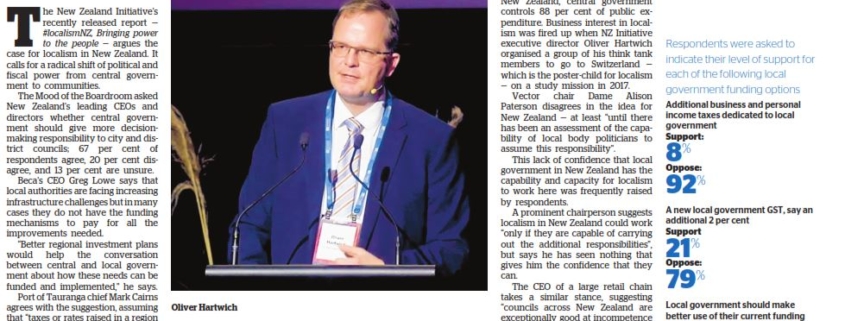http://bit.ly/2mmGDG8
The New Zealand Initiative’s recently released report — #localismNZ, Bringing power to the people — argues the case for localism in New Zealand. It calls for a radical shift of political and fiscal power from central government to communities.
The Mood of the Boardroom asked New Zealand’s leading CEOs and directors whether central government should give more decision-making responsibility to city and district councils; 67 per cent of respondents agree, 20 per cent disagree, and 13 per cent are unsure.
Beca’s CEO Greg Lowe says that local authorities are facing increasing infrastructure challenges but in many cases they do not have the funding mechanisms to pay for all the improvements needed.
“Better regional investment plans would help the conversation between central and local government about how these needs can be funded and implemented,” he says.
Port of Tauranga chief Mark Cairns agrees with the suggestion, assuming that “taxes or rates raised in a region are hypothecated to that region”.
Says an energy boss: “decentralisation isn’t about existing councils having more power, it is about distributing that power on relevant topics to even smaller democratic units.”
A software boss agrees, suggesting that “decisions are always better made when the decision maker is closer to the community”.
Simon Ellis, managing director at Ovato NZ, is unsure, and says it depends in what areas the decision-making is in. “In most instances in New Zealand we should have the same rules across the country — central government cannot absolve its responsibilities to NZ Inc,” he says, giving water quality, water safety and fluoridation as examples.
In New Zealand, council revenue is largely separated from economic performance.
Local government is the core funder of transport and water services for new development, yet its revenue is derived from property rates — which are a cost allocation method linked to council costs, and not to the success of the economy or land prices.
Conversely, central government is the direct benefactor of growth: receiving increased GST, income tax and corporate tax when the economy grows.
New Zealand is unusual in that it is among the most centralised countries in the world. Local government is responsible for almost half (46 per cent) of public spending in OECD countries on average, whereas in New Zealand, central government controls 88 per cent of public expenditure. Business interest in localism was fired up when NZ Initiative executive director Oliver Hartwich organised a group of his think tank members to go to Switzerland — which is the poster-child for localism — on a study mission in 2017.
Vector chair Dame Alison Paterson disagrees in the idea for New Zealand — at least “until there has been an assessment of the capability of local body politicians to assume this responsibility”.
This lack of confidence that local government in New Zealand has the capability and capacity for localism to work here was frequently raised by respondents.
A prominent chairperson suggests localism in New Zealand could work “only if they are capable of carrying out the additional responsibilities”, but says he has seen nothing that gives him the confidence that they can.
The CEO of a large retail chain takes a similar stance, suggesting “councils across New Zealand are exceptionally good at incompetence — I am not in favour of increasing any of their responsibilities”.
A lobbyist head offers a more candid take: “Hell no. They are often completely loony and I wouldn’t trust most of them to run a pub raffle.”
The NZ Initiative has published a string of reports on localism, including examining the myths, facts and challenges about local government; advocating for a Local Manifesto to restore local government accountability and giving a global perspective on localism.




Leave a Reply
Want to join the discussion?Feel free to contribute!